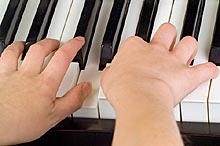| Magazine Home I Links I Contact Us |
|
Home |
Learning Disabilities Clarified: Learning is a SkillThe subject of this discussion, that learning is a skill, is apparently one of those ideas that are generally regarded as self-evident. Most people, however, do not seem to realize the implications involved. Before continuing, I wish to explain what is meant by the term learning in this discussion. After all, the term learning is used in many different types of situations. There are instances where learning takes place without any skill being involved on the part of the learner. For example, when I walk into an unfamiliar room and hit my foot against a step which I did not see, I will have learned something, namely to be more careful next time I enter that room. However, this act of learning, which happened quite unintentionally, occurred without any skill on my part. There will also be very little difference between the speed and effectiveness with which different people will learn to evade this step. For most people, one encounter, or at the most two, will be sufficient. However, when I learn history or algebra, or a foreign language, or how to play chess, or how to operate a lathe, then it is a different matter altogether. Now there is definite deliberation and consciousness of purpose involved, which was absent in the other example. At the same time there is also wide discrepancy in the effectiveness with which different people will be able to master whatever they wish to, or have to, learn. For example, one person will be able to learn to speak a new language within one year, while another will not be able to do the same in ten years. This discrepancy is frequently explained in terms of intelligence. If this explanation does not apply, i.e. if a child of obviously good intelligence is not able to learn according to expectations, a second explanation is put forward: it is then said that the child has a learning disability. But are these really the only explanations? I think not. In order to present an alternative possibility, I have to remind the reader of a few important truths concerning learning. The first of these is: 
The second important fact about learning is:
At this point it is important to note that learning itself is a skill. Despite its apparent self-evidence, this is an extremely important concept, and it is only when one starts to realize its full implications that an alternative explanation for the discrepancy in the learning abilities of different persons emerges. In order to grasp the full import of this concept, it is vital that one should also take cognizance of the different elements of a skill. The Different Elements of a Skill First of all, we should note that every skill must be acquired. As already stated, no human being can do anything at all which he has not learned to do. This must certainly apply to the skill of learning also. However, the attitude so far seems to have been that learning is a fafrotsky. (Something that falls from the sky.) Very little is ever done to teach children to learn. Secondly, there is usually a particular method involved in any skill. Take swimming as an example. It frequently happens that the first method by means of which a novice swimmer learns to remain afloat is by swimming dog-fashion. Employing such an unorthodox method is good enough to enable one to remain on the surface of the water, but will certainly not help anybody to become a really good swimmer or to take part in swimming galas. Any of the standard swimming strokes presents a far better method of remaining afloat and of proceeding through the water. After having learned one of these strokes, and having received enough practice in this new method of swimming, a person will immediately be turned into a far better swimmer. Strangely enough, though, nothing is ever done to teach children a better method of learning. As stated, this apparently happens because learning is regarded as a fafrotsky. The third element of any skill has already been mentioned. It is the fact that regular and sustained practice also makes a vast difference to a personís competence at any skill. Yet children are never taught to practice their learning skills on a regular basis. Most children merely do the most important homework every day, and only study the day before a test or examination. 
There is also a fourth, very important element involved in every skill, namely the fact that a skill usually embraces a number of sub-skills. This can best be explained by means of an example. In order to acquire the skill of playing the piano, a person must possess agile fingers, must know the positions of and the distances between the notes on the piano by touch, must have a keen ear, etc. These faculties can be developed through regular practice of finger exercises, by playing scales and arpeggios and by doing ear training exercises. Through regular and sustained practice of these sub-skills of the main skill of playing the piano, a person eventually acquires the ability to play the piano. Now, it so happens that I can also play the piano a little, but only a very little. I doubt, however, whether anybody listening to my clumsy efforts would ever describe me as having a piano-playing-disability. Any reasonable person would understand that if I regularly practice the sub-skills of playing the piano mentioned earlier, I shall eventually lose my two left hands on the piano. When we observe the clumsy efforts of a child who tries to learn, however, we readily diagnose him as having a so-called learning disability. The point is that there are also sub-skills of learning, and regular and sustained practice of these makes a vast difference to a person's learning ability. If little or nothing has been done yet to help a child to practice and develop these sub-skills of learning, it is just as illogical to refer to him as having a learning disability as it would be to describe my efforts of the piano in such terms. This idea seems to present a logical alternative to that of differences in intelligence and so-called learning disabilities when considering discrepancies in learning ability. Its plausibility is strongly substantiated by the enormous successes that have over the past years been achieved with the Audiblox program, which is a program of exercises for the sub-skills of learning. Simultaneously, this theory suggests that learning does not take place on a single level, but is rather an action which is accomplished in a sort of layer-fashion. This happens because the acquisition of one skill often makes it possible to master another one. In fact, the way in which our school system is organized is an acknowledgement of this fact. We cannot send a child to university first. He must start at the first class, and then progress year after year to the higher levels of education. At the end of every year the child is also expected to provide proof that he has mastered enough of the knowledge that was presented to him during the year so that it will form a sufficiently firm base on which to start building the knowledge of the following year. The reason for this is that most of what we learn is based on something we learned before. An example should make this clear. Suppose there was a child who has not yet learned to count. It would be quite impossible to teach such a child to add, subtract, multiply, or divide. This would only become possible after the child has leaned to count. This suggests that counting is a lower-lying skill than calculating, and that mastery of a lower-lying or foundational skill is a prerequisite for mastering any higher-lying skill. In the same way there are also skills that form the basis or foundation of skills like reading and spelling. If a child, for example, has not adequately mastered the foundational skills of reading, he would be a very poor reader, and there would be no way in which he could be turned into a better reader other than by first practicing and developing these foundational skills of reading. Unless this is done, every other effort is doomed to failure, and doubtless such a child would then be categorized as dyslexic. The Audiblox program is a program of exercises intended to practice and develop all the foundational skills necessary for school and after-school learning. The correct time to start developing these skills is the preschool period, preferably from about 3 years of age. However, because it is possible through constant and sustained practice of these exercises to develop these skills to a remarkably high level at any time of life, thereby increasing a person's study ability, persons of any age can benefit from such a program. Sub-skills of Learning The Audiblox exercises require a great deal of concentration. A person who regularly does exercises of this nature, will thereby improve his powers of concentration tremendously. Many parents and teachers nowadays complain about the fact that children cannot concentrate. This is usually regarded as a disability. However, if one questions what has been done to teach the child to concentrate, one invariably finds that nothing has been done. Remember the truth about learning which I stated earlier on, that a human being cannot do anything which he has not learned to do. Concentration is a skill, one of the sub-skills of learning, and any skill has to be acquired, after which oneís proficiency at it can be constantly improved by regular and sustained practice. A further sub-skill of learning which is very heavily emphasized throughout the whole Audiblox program is perception. As a matter of fact, the Audiblox program is a very comprehensive and extremely effective program for perceptual development. Before we can learn anything, we have to become aware of it through one of our senses. Usually we have to see or hear it. Subsequently one has to interpret whatever one has seen or heard. In essence then, perception means interpretation. Of course, lack of experience may cause a person to misinterpret what he has seen or heard. Perception is therefore a skill which can be improved tremendously through practice. A further important point about perception is that it is a skill which is by itself made up of a large number of sub-skills. One of these is, for instance, the ability to distinguish left and right. One frequently comes across children who confuse a b with a d, or who read no when the word is actually on. This does not mean that there is anything wrong at all with such a child. He has simply not yet learned to distinguish well enough between left and right. Invariably such children are also very poor readers and spellers. Once they have learned, through the regular and sustained practice which the Audiblox program provides, to distinguish between left and right, they will stop confusing b's and d's, and words like now and won, and at the same time their reading, and later also their spelling ability, will improve immensely. Perceptual skill is extremely important in order to become a good reader. As far as reading is concerned, perception is a foundational skill, just as counting is for the ability to calculate. A person who cannot learn to spell, or who cannot learn to read, a so-called dyslexic, is frequently simply a person in whom one or more of these sub-skills of perception have not been adequately developed in order to make it possible for this person to acquire the skill of reading. The fact that already many so-called dyslexics have with the help of the Audiblox program succeeded in acquiring a normal reading ability, must be adequate proof that it is an extremely comprehensive and effective program for the development of all the sub-skills of perception. The Audiblox program is an extremely effective program for memory training. Memory is, of course, a further sub-skill of learning. Having perceived something, we have to be able to store it, that is, remember it, before it will become knowledge. This is a skill which is of special importance in the so-called learning subjects at school or university, where information is presented to the learner, and it is expected that he be able to reproduce it as accurately as possible. However, memory is a skill that is also of great importance to the reading act. For example, recognizing the shapes of the different letters comprising a particular word is an act of memory. Every word also consists of letters in a particular sequence, and one has to remember what word is represented by the sequence of letters in question. Simply by changing the sequence of the letters in name, it can become mean or amen. Memory is a sub-skill of learning which can itself also be subdivided into a number of sub-skills, for example short-term visual memory and long-term visual memory, short-term auditory memory and long-term auditory memory. All these receive attention in the Audiblox program. Having stored information in one's memory, it is sometimes required that a person be able to process it in some fashion. This is of importance in subjects like mathematics or language. Such processing of information usually requires the ability to see relationships or correspondences, or to draw conclusions. This requires an ability to reason and think logically, also a very important sub-skill of learning, which is heavily emphasized in the Audiblox program. Returning to the matter of learning disabilities, it must be clearly understood that it is not my intention to imply that the theory expounded in the discussion must be regarded as the only cause of all learning failure. There certainly are other factors which cause children to be poor learners. For example, there are many children who cannot cope due to emotional instability. In many cases such emotional problems are brought about by the fact that the child has already experienced so many failures that he believes himself to be inferior to other children. By helping the child to improve his learning skills, and thereby to start experiencing the satisfaction of success, such emotional problems are frequently alleviated. It must be understood, however, that there are many other causes of emotional problems, which cannot be dealt with here. A further cause for learning failure is the fact that the level of difficulty of the subject matter that the child is expected to master becomes higher and higher every year. In each new grade to which a child is promoted he has to be able to master work which is more, and more difficult, than that he had to deal with the previous year. Of course, as a child gets older, his intellectual ability also grows. Sometimes, however, the increase of the level of difficulty of the subject matter from year to year occurs at a faster rate than the growth of the child's intellectual ability. It is then that the child starts having difficulties. The only solution is to develop the childís learning skills by means of a program like the Audiblox program. This will improve the child's learning ability, so that he will be able to keep up with increasing pressure. Because all children run a risk of being overtaken by the level of difficulty of the school subject matter, it is therefore wise to take timely precautions. Nobody would ever gamble with a child's physical life and well-being. Why then gamble with a child's learning life and well-being? By teaching the child to learn, any future mishaps will be prevented. 
Even a child who is less gifted can benefit greatly from a regular program of exercise for the sub-skills of learning. A comparison with the physical counterpart should make this clear. If a very big man takes up weight-lifting, he could become very strong indeed. A much smaller man can also increase his strength considerably by exercising with weights, but he will never be able to match the strength of the big man. If the big man does not exercise and the smaller man does, then of course there is the very real possibility that the strength of the smaller man will in time surpass that of the big man. Similarly, a less gifted child will derive a lot of benefit from the mental exercise provided by the Audiblox program, and may even in time exceed the achievement level of an initially more gifted child who does not take part in any program of this nature. In the determination of man's behavior, there is no process more important than learning. One of the most worthwhile enterprises a person could engage in is therefore to help unravel the mysteries of this process. No final answers concerning the nature of learning have yet been presented. The existing theories on learning all leave too many unanswered questions. The approach offered in this discussion is an attempt to find logical answers to some of these. If learning is a skill, as is suggested by this theory, then a solution immediately becomes available for all the many children who battle with co-called learning disabilities. |
| Home A B C D E F G H I J K L M N O P Q R S T U V W X Y Z |